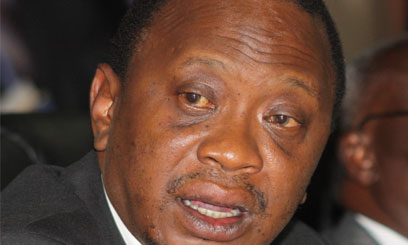NAIROBI, Kenya, Jan 18 – The Treasury has projected that the 2012/2013 expenditure will be Sh1.1475 trillion, remaining virtually unchanged from the current fiscal year’s budget of Sh1.155 trillion.
According to the Budget Review and Outlook (BRO) for 2012/2013-2014-2015, the Treasury targets revenue of Sh922.6 billion for the 2012/2013 budget, with an ambitious goal of attaining four months import cover to build forex reserves by June 2013.
The overall budget deficit for 2012/2013 is projected to be about Sh177.7 billion equivalent to 4.6 percent of GDP.
To improve revenue collection, the Treasury intends to review tax codes, rationalise existing tax incentives, remove tax exemptions and expand the income tax base.
The 2012/2013 Medium Term Economic Framework (MTEF) Budget is being prepared against a backdrop of severe economic challenges and is expected to be implemented in an equally monumental year.
Minster for Finance Uhuru Kenyatta, who spoke during MTEF public sector hearings on Tuesday, said the budget marks the end of the implementation of the first phase of the Kenya Vision 2030.
“It (MTEF) will facilitate the first General Elections under the Constitution of Kenya 2010. It will lay the foundation for fiscal decentralisation,” he said.
Final proposals to the MTEF will be submitted to Parliament by April 30 that will serve as a reference in preparing the 2012 Budget Policy Statement.
Despite the events of 2011 that brought a slew of external shocks, Kenyatta said economic performance remained strong and projected a GDP growth of 5.3 percent for 2012.
However, growth figures could peak to between 5.5 percent and 6.0 percent given that there is expansion in agriculture, tourism and exports in 2012.
In 2012, fiscal policy is expected to support economic activity while sustaining public financing that should see overall deficit reduce to below five percent in the Medium Term and bring down the debt-to-GDP ratio to less than 45 percent.
The expenditure side experienced demand for additional spending pressures in 2011, to accelerate the implementation of the Constitution, deal with security operations, salary demands from various sectors and servicing the increased external debt.
The government, Kenyatta said, would have to pay special attention to macro-economic stability while formulating the next budget.
Austerity measures aimed at rationalising expenditures and cutting back on non-essential services have been announced by government that should see the budget deficit drop from the current 6.1 percent of GDP to 5.1 percent by 2014/15.
Kenyatta also said inflation should come down from 19.7 percent experienced in November 2011 to an estimated 5 percent by 2014/2015.
The Treasury estimates that inflation should ease gradually to 7.9 percent by the end of June 2013.
Still the macroeconomic impact will have an effect on growth moving forward with the Treasury reviewing previous projections of 5.7 percent to 5.3 percent for 2012.
Several risks have been taken into account affecting the economy in 2012 including further weakening of the global economy, looming fuel price hikes and unsuccessful devolution process.
With Sh87 billion expected to have been raised for the first half of 2011/2012 fiscal year in domestic borrowing, the Treasury has only been able to take in Sh17 billion by December 2011 and borrowed Sh14 billion.
The proposed $600 million loan sought by government to finance the budget deficit is expected to be concluded in the next two weeks.
As Kenya’s first dollar-denominated syndicated loan from foreign banks the $600 million will also be used to finance infrastructure including ongoing road projects as well as projects in the irrigation and energy sectors.
Apart from allowing the government to front-load the financing for infrastructure the loan is expected to ease pressure on the shilling and domestic interest rates while boosting international foreign exchange reserves.
About Sh100 billion is expected from external loans and Sh77.6 billion for net domestic borrowing in the 2012/2013 fiscal year.
In efforts to enhance efficiency, transparency and accountability in the cash management system and resource management, Kenyatta said The Public Finance Management (PFM) Bill has been finalised and is waiting to be presented before Parliament for enactment.
The PFM Bill once enacted, he adds will finally anchor various public finance management reforms into law.
Some reforms in PFM include improvements in the cash management systems, procurement processes, tax administration, internal and external auditing system, introduction of Programme-based Budgeting and re-engineering Integrated Financial Information Systems (IFMIS).



































